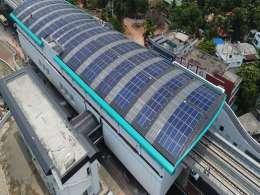Noida-based Attero Recycling, an electronic waste recycling company, is raising a total of $8.3 million in funding from International Finance Corporation, Granite Hill and existing investors. In the latest follow on round, which is awaiting board approval, IFC has agreed to commit up to $5 million into the waste management company. It has raised about $3.3 million in a Series B round led by Granite Hill India Opportunities Fund with participation from existing investors, IndoUS Venture Partners and Draper Fisher Juvertson. While the company closed the Series B in May, it received interest from IFC for a follow on financing only in the first week of August. Without disclosing the valuation details, Nitin Gupta, founder, Attero Recycling told VCCircle that there has been a "significant step- up in valuations from the previous Series A round". In 2008, it raised $6.3 million from IndoUS Venture Partners and Draper Fisher Jurvetson. Attero is also raising some debt to balance its capital structure.
Sameet S. Mehta will join the Board of Attero as a Director on behalf of Granite Hill. Mehta founded Cisco Systems’ India venture capital effort in August 2004, and has also served on the board of Nimbus Communications and as a board observer with IndiaGames and Bharti Telesoft.
“We are unique in India for operating across the full spectrum of the e-waste recycling activities, from sourcing to recovery of component materials,” Nitin Gupta, Founder Attero Recycling told VCCircle. Gupta added that the company supports climate change because re-cycling metals from its “state-of-the-art e-waste technology consumes less energy and generates less hazardous emissions than mining them”. It is also currently the first and only such end-to-end e-waste recycler officially recognized by the Government of India as having environmentally sound management facilities, he added.
It currently has an automated facility for integrated e-waste recycling at Roorkee, Uttrakhand. Gupta added that they have a first-of-its kind indigenous metallurgical process developed in its R&D division and a close technical collaboration with a leading US company for mechanical separation. Attero, (which means “waste” in Latin) can currently recycle 36, 000 tonnes of e-waste per annum. It has more than 165 clients which include Wipro, HCL, Tata Tele Services, and Google among others.
The company plans to use the funds to further enhance the technology of their plant and strengthen their collection system. The monies will be used in expanding its recycling capacity; growing its sales and marketing activities, raising awareness of the importance of safe disposal of e-waste; developing the logistics of sourcing e-waste across the country; and continuing its research and development initiatives to improve the efficiency of its recycling operations.
The waste management space is seeing increasing interest from the investment fraternity. Apart from Attero’s subsequent rounds of funding, Kam- Avida Enviro Engineers, a waste management equipment manufacturer raised funds from Peepul Capital in 2008.
Gupta added that the opportunity set is huge with India becoming a dumping ground for e-wastes.“IT sector is the largest contributor to e- waste with the growing sale of PC’s and laptops across the country. Also, the life of PCs is going down, and there is a growing realization that avoiding the dumping of hazardous substances have negative health impacts.”
Despite its common classification as a waste, disposed off electronics are a considerable category of secondary resource due to their significant suitability for direct reuse (for example, many fully functional computers and components are discarded during upgrades), refurbishing, and material recycling of its constituent raw materials. Reconceptualization of e-waste as a resource thus pre-empts its potentially hazardous qualities.
Added to is the fact that a lot of companies see such wastes as a potential source of data leakage. According to a latest study by the United Nations Environment Programme, e-waste from computers in India will increase by 500% by 2020, 18 times from mobile phones, two times from TV and 2-3 times from discarded refrigerators. The projected e-waste generation in India is expected to increase to about 8.0 lakh MT by 2012. As per the survey by the Central Pollution Control Board (CPCB), it is estimated that about 1.47 lakh MT of e-waste was generated in 2005.





